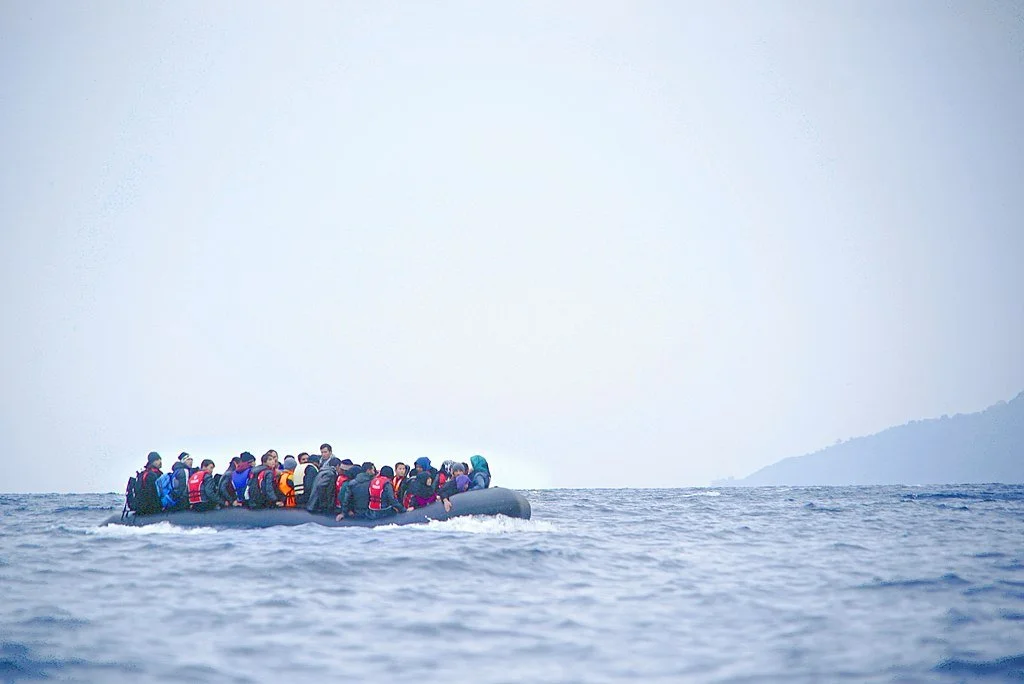The United States, Panama and Colombia have issued a new plan to end migration through the Darién Gap, a jungle passage between Colombia and Panama. According to Al Jazeera, this 60-day campaign was created to “end the illicit movement of people and goods through the Darién by both land and maritime corridors,” and will implement “new lawful and flexible pathways for tens of thousands of migrants and refugees,” per a U.S. Department of Homeland Security statement. The Associated Press described the third part of this new plan as an investment to lessen poverty and build more jobs in the communities that are on the border of Colombia and Panama to discourage trade from smuggling migrants.
Mexican immigration officials charged for the Ciudad Juárez migrant center fire
On Tuesday, April 11, criminal charges were brought against Mexico’s top immigration official, Francisco Garduño, for the fire that killed 40 people in March 2023, NPR reported. Five other lower-ranking officials have also been charged, as well as a Venezuelan migrant. The fire occurred on March 27 in a facility housing 68 men, CNN explained.
Air National Guard employee leaks classified Pentagon documents
On April 14, 2023, Jack Teixeira, who was charged with releasing classified government documents, appeared in federal court for a hearing, NBC Boston reported. According to BBC News, the documents contained information describing how the United States government views Russia’s invasion of Ukraine, along with information about allies of the U.S. and their involvement in the war. The leaked documents have raised concerns about how safe classified information is in the U.S..
Military unification efforts in Ethiopia lead to violent protests
Large protests, which began on April 5, 2023, have taken place in Ethiopia’s Amhara region in reaction to the government’s decision to create a unified paramilitary force, BBC reported. According to Reuters, members of Amhara’s special forces and militias opposed Prime Minister Abiy Ahmed’s command to merge the regional military with the national force. Ahmed has claimed that the new plan was made “for the sake of Ethiopia’s national unity.”
Wall Street Journal reporter stationed in Moscow arrested on spy charges
On March 30, 2023, the Russian Federal Security Service announced that they had detained Evan Gershkovich, an American reporter for The Wall Street Journal, and were opening an espionage case against him, The Guardian reported. According to CNN, the FSB has charged Gershkovich with attempting to “obtain state secrets.” Almar Latour, chief executive of Dow Jones, the company that publishes The Wall Street Journal, has staunchly denied this allegation.
United Nations adopts new, more progressive climate change initiatives
The United Nations adopted a new resolution on March 29, 2023, which requested that the International Court of Justice give an advisory opinion on countries’ obligations to combat climate change, a U.N. press release reported. The U.N. also asked the ICJ to weigh in on the consequences for countries that do not provide aid to efforts that combat climate change. The resolution highlighted developing island nations and the global south as regions that experience the impacts of climate change disproportionately.
Fatal fire at Mexican migrant detention center kills asylum seekers
On March 27, 2023, at least 38 migrants from Central and South America died in a fire at a migrant detention center in Ciudad Juárez, Mexico, Reuters reported. According to NPR, a surveillance video, which was posted online, shows detainees trapped in a locked cell while uniformed agents left the building without aiding them. BBC reported that the agents ignored the men trying to escape the fire while they yelled and banged on the door. After the smoke filled the room, however, it is unknown what took place at the facility.
Proposed judicial overhaul of Israeli judicial system sparks mass protests
On March 27, 2023, Prime Minister of Israel Benjamin Netanyahu announced that he will be delaying the proposed judicial reforms that were announced earlier this year. According to an Al Jazeera news article, this announcement followed a mass strike of workers across the country, as well as protests from tens of thousands of Israelis opposed to the reforms. Malls and kindergartens were closed, seaport workers refused to work and flights were suspended at Ben Gurion International Airport. Al Jazeera also explained that the delay announced last Monday means that the proposed changes will not be voted on by parliament until late April at the earliest.
Macron’s pension reform survives amid vote of no-confidence victory
20 years have passed since the US-led invasion in Iraq
20 years ago on March 20, 2003, the United States invaded Iraq, starting the war on terror with the goal of ending President Saddam Hussein’s rule and removing the alleged weapons of mass destruction from Iraq, Al Jazeera reported. According to Council on Foreign Relations, the U.S., the United Kingdom and other allies swiftly took over the Iraqi Army, and three weeks after the invasion U.S. soldiers and Iraqi civilians pulled down a statue of Saddam.
Northern Irish party weighs risks and rewards of the Windsor Framework
On Feb. 27, 2023, legislation from the British parliament titled the Windsor Framework was introduced. According to PBS News, the bill will open the border between Northern Ireland and the United Kingdom, allowing free trade in place of the previously restrictive custom checks on some goods such as meat, eggs and medicine.
Over 100,000 protesters in Mexico demonstrate against election reform bill
Migrant boat carrying over 200 people sinks off coast of Calabria, Italy
The German Studies Department Hosts a discussion with Dr. Damani J. Partridge
China and Taiwan relations have create more tensions between China and the US
United States debates withdrawing military resources from Nigeria
The war between Russian and Ukraine enters its second year
Masking practices continue in South Korea and Japan, despite decreased regulation
Graphic by Mari Al Tayb ‘26.
By Qingyun Shi ’23
Staff Writer
On Jan. 31, 2023, South Korea dropped indoor mask mandates, a New York Times article reported. Beginning March 13, 2023, the government of Japan will further ease COVID-19 guidelines on mask-wearing, including those pertaining to public transportation and schools. According to The Japan Times, Prime Minister Fumio Kishida hopes that relaxing public health measures will benefit economic and social activities.
The New York Times article explained that wearing a mask has become part of a daily routine in people’s lives over the past three years, especially in some East Asian countries where pandemic restrictions have lingered for much longer than in other parts of the world. Despite the fact that governments are now easing legal restrictions, the article reported that many residents in countries such as South Korea and Japan are unlikely to stop wearing masks completely any time soon.
Naomi Tanaka, who lives and works in Japan, spoke to this issue in a recent interview with Mount Holyoke News. “Japanese people have always been wearing mask[s], even before COVID-19,” Tanaka said. “In Japanese society, wearing masks is very common; many people — including me from time to time — will put on a mask when going outside.”
There are several reasons for people to continue wearing masks, according to the article. First, the habit can be difficult to change since masking has been the norm for the past three years. In Japan, for example, some call masks “kao pantsu,” or “face pants,” to convey that individuals would feel the same level of embarrassment when removing their masks as when removing their pants in public, The New York Times explained. For others in South Korea and Japan, masking can be a solution for social pressures around behaviors such as wearing makeup or smiling frequently. The article also explained that mask-wearing is seen as an effective measure for protecting individuals such as the elderly or those at risk of developing severe symptoms from being infected with COVID-19.
Tanaka discussed the reasons why many people in Japan still wear masks. “I think there are two main reasons why Japanese people adopted this habit. One: wearing a mask when sick is a sign of consideration for others in Japanese culture. Two: Many Japanese people are allergic to flower [spores] in the air, especially in the spring. Wearing a mask can help you avoid contact.”
As of March 13, passengers on public transportation in Japan will not be required to wear masks due to individual seating, an article by The Japan Times reported. Students and teachers will also not be required to wear masks during upcoming graduation ceremonies as long as preventative health measures are put in place, such as adequate ventilation in rooms. The government will also encourage institutions to not pressure people to remove their masks if individuals wish to continue wearing them. Masks will continue to be recommended in congested indoor areas when social distancing is impossible, The Japan Times said.
Although both South Korea and Japan are continuing to reduce mask regulations, The New York Times reported that health authorities in both countries still encourage mask-wearing. COVID-19 infections in both countries have declined steadily in the past month, but health authorities worry that decreased regulations around masks and travel restrictions will cause another spike in cases.
More than 200 asylum-seeking children go missing in the UK
Over 200 asylum-seeking children, mainly from Albania, disappeared from government housing in the U.K., causing concern over migration policies. Photo courtesy of Alisdare Hickson via Flickr.
By Kiera McLaughlin ’26
Staff Writer
Content warning: This article mentions human trafficking and involuntary sex work.
An investigation by The Observer broke the news in mid-January that over 200 asylum-seeking children are missing in the United Kingdom, The New York Times reported. NPR reported that Robert Jenrick, the minister for immigration in the U.K., notified lawmakers that more than 200 children and teenagers under 18 were missing from government-approved accommodations, most of whom were teenage boys from Albania.
According to The New York Times, this government-approved housing consists of hotels, where asylum seekers stay until the Home Office moves them to a more stable location. Yvette Cooper, head of immigration policy for the Labour Party, explained to The New York Times that “there is a pattern here but no one is properly investigating.” She went on to say that “there is no targeted unit going after them and saying, ‘this is a pattern,’ where young people are being trafficked across the channel and then into cannabis farms — or into prostitution in some of the worst cases — but into organized crimes, being picked up from outside these hotels.’”
According to an article by BBC News, there has been an exponential increase in Albanian migrants coming to the U.K. over the past three years. The New York Times reported that in the last year, approximately 40,000 people made the trip across the channel to the U.K., including 13,000 Albanians. Prime Minister Rishi Sunak has been working towards slowing the number of migrants coming to the U.K. and refusing to grant asylum to many.
An article by The Observer explained that these goals to create strict immigration laws have worked in traffickers’ favor, as some traffickers have been exploiting the Home Office’s policy of deporting asylum seekers to Africa in order to target young asylum seekers. “Traffickers tell them they’ll be sent to Rwanda if they stay in the hotel,” sources told The Observer.
The Guardian reported that their whistleblower who works at a hotel in Hythe, Kent, believes that approximately 10 percent of the children seeking asylum in the U.K. disappeared each week. The article continued to explain that there are many unaccompanied asylum-seeking children in the U.K. Figures published by the Guardian show that in hotels run by the Home Office, 282 children have gone missing in the six months between April and October, and seventy had not been found.
Many organizations and the Home Office are disputing who is to blame for the lack of action on behalf of these children. Al-Jazeera reported that “rights groups condemned the [U.K.] government, while The Adolescent and Children’s Trust (TACT), a fostering charity, said the Home Office had ignored its calls to place the children in care homes.”
According to The Guardian, many asylum-seekers in the U.K. have been met with anti-migrant protests. The Guardian reported that an organization called HOPE Not Hate, which tracks far-right activity, identified five anti-migrant demonstrations that took place over the weekend. Clare Moseley, the founder of Care4Calais, a volunteer-run refugee charity, has called out the U.K. government for not protecting asylum seekers, according to the Guardian. When speaking of the U.K. government’s lack of action in defense of asylum seekers, Moseley said that “not having documents makes you vulnerable and makes it difficult to stand up for yourself. Intimidating asylum-seekers is an act of pure cowardice. We need a government that shows leadership and protects the vulnerable rather than empowering bullies by using damaging and divisive rhetoric.” Rebecca Hamlin, a professor of legal studies and political science at the University of Massachusetts Amherst, echoed these sentiments and said in an interview with Mount Holyoke News that “the anti-immigrant politics in the U.K. is very toxic, and portrays a lot of people with legitimate claims for protection under international and domestic law as illegal and undeserving.”
The roles of this rising anti-migration movement in the U.K. and the response by the government have led to unrest and fear for asylum-seekers around the country, according to NPR. As reported by NPR, Labour Party lawmaker Peter Kyle pointed out in the House of Commons that “the uncomfortable truth for us is if one child who was related to one of us in this room went missing, the world would stop. But in the community I represent a child has gone missing, then five went missing, then a dozen went missing, then 50 went missing and currently today 76 are missing and nothing is happening.” While the number of asylum-seeking children placed in hotels by the Home Office increases, people like Yvette Cooper, Clare Moseley and Peter Kyle continue to speak up for the missing children seeking asylum.
Leader of Scottish National Party announces her resignation
Nicola Sturgeon, the First Minister of Scotland and leader of the Scottish National Party, to resign. Photo courtesy of First Minister of Scotland via Flickr.
Jendayi Leben-Martin ’24
Global Editor
On Feb. 15, 2023, First Minister of Scotland Nicola Sturgeon announced her resignation from the role, a New York Times article said. According to BBC News, Sturgeon is the longest-serving first minister in Scottish history, as well as the first woman to ever hold the position.
The announcement of Sturgeon’s resignation comes amid controversy in Scottish politics. The New York Times article explained that in recent weeks proposed Scottish legislation aimed at making gender transitions easier was shot down by Britain’s Parliament. However, Sturgeon maintains that the recent controversy is not the reason for her resignation, a CNN article said. Sturgeon reassured skeptics that “[the] decision is not a reaction to short-term pressures.”
As the leader of the Scottish National Party, Sturgeon has spent the past eight years working towards Scottish independence, the party’s founding goal, a BBC News article explained. In fact, according to the SNP website, Sturgeon has been advocating for Scottish independence since she was sixteen, and over the duration of her career, she has worked toward making Scotland an active participant in world politics.
In a press conference addressing her resignation, Sturgeon said that a new leader will be better equipped to achieve Scottish independence, as Sturgeon herself believes that she has become too polarizing of a figure. According to BBC News, Sturgeon’s resignation leaves Scotland without a decisive leader in ongoing discussions surrounding Scottish independence and the prospect of future referendums. As reported by CNN, a majority of Scottish voters expressed that they wanted to remain a part of the U.K. in 2014. However, after Brexit in 2016, popular Scottish opinion on independence may have changed. According to CNN, support for independence had grown since Scotland was forced out of the European Union by the U.K. in 2016, but hopes for a referendum have faced some recent obstacles.
CNN reported that in November 2022 the British Supreme Court barred the Scottish government from holding a second referendum on its own, meaning that any referendum plans must now be approved by the U.K. government. BBC News explained that the SNP is holding a conference in March to figure out how to address these restrictions and move toward a second referendum, but Philip Sim, a political correspondent for the BBC, stated that “with no clear successors waiting in the wings if Ms. Sturgeon isn’t running the independence campaign, it’s not clear who will be placed to call the shots.”
According to BBC News, Kate Forbes, a current parliament member, is one of the front runners to take over Sturgeon’s role. Some of Forbes’s ideas conflict with the political precedent that Sturgeon has set, however. For example, Forbes, who was on maternity leave during the vote that passed the self-identification legislation in the Scottish Parliament, has said that she would not have voted in favor of the bill, and that, as first minister, she will not fight the U.K. government on their block of the legislation. Nick Eardley of the BBC reports that this conflict reflects an upcoming change in the direction of the SNP. BBC News reported that Sturgeon will remain in office until her successor is elected.




















